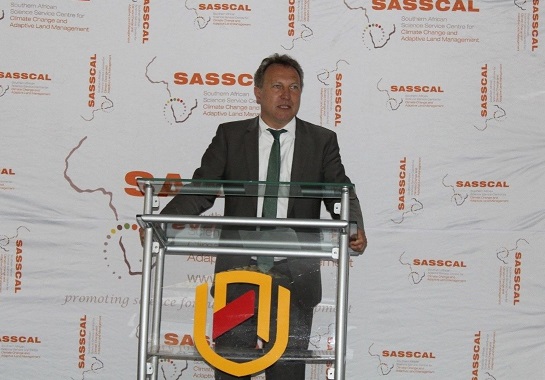SASSCAL in collaboration with Namibia University of Science and Technology (NUST) hosted a stakeholder engagement workshop on 21 May 2019 in Windhoek, Namibia marking a major milestone towards the establishment of the Integrated Water resources Management (IWRM) Graduate Studies Programme.

Professor Rene Haak – Head of Division 723, Global Change and Germany Board Member for SASSCAL
With funding from the Germany Federal Ministry of Education and Research (BMBF),the establishment of the Graduate Studies Programme is envisioned to strengthen national and regional capacity in water resources management. The IWRM Graduate Studies Programme in NUST will be the first in the process of establishment of centres of Excellence in the region. This effort is complemented by regional and international collaborating institutions in academia, the public and private sector.
Professor Rene Haak (German Board member) stated in his opening remarks that the vision on BMBF and SASSCAL is that of establishment of a group of graduate schools of Excellence in the region. Prof Haak expressed confidence in the SASSCAL Executive Director Dr Jane Olwoch as the ideal person and office to drive this Vision to realisation. NUST Vice Chancellor-Research and Innovation, Professor Pramanathan Govender in his welcoming remarks emphasised on the need for the region to develop technical and managerial expertise that can respond to the complex environmental challenges that plague Southern Africa. Prof Govender also highlighted on the inadequate capacity in the region in terms of qualified professionals to assist the region with mitigation measures.
Mr Abraham Nehemia represented SASSCAL Deputy Board Chair and Deputy Minister in the Ministry of Agriculture, Water and Forestry, Hon Anna Shiweda. “The need to build capacity in the country, within SASSCAL member states as well as the entire region cannot be over emphasised” stated Mr Nehemia. With the current climate change projections, it has become imperative for the region to be well equipped with the right expertise to address these challenges. The Paris Agreement of 2015 refers explicitly to international research cooperation first and foremost in order to help the most affected countries to adapt to climate change and to reduce emissions. To address challenges and threats posed by climate variability and change, decision makers at all levels need scientifically sound information and knowledge to develop adaption and mitigation strategies and to sustainably develop the southern African environment, economies and societies. The IWRM programme is a key in addressing the gap in regional expertise concluded Mr Nehemia. Dr Jane Olwoch in her welcome remarks added that SASSCAL is well suited and has adequate structures, collaborations and partnerships to strengthen the regional capacity through training of professionals. “For these professionals to have a meaningful impact in the region, they will be trained at high academic levels especially at PhD in collaboration with Regional and Germany Universities to facilitate knowledge and technology transfer,” she added.
Dr Anna Matros-Goresses the Director of the Projects Services Unit in her presentation stated that the Programme will support capacity development, both in terms of human and infrastructure, and thereby improve the regional ability to effectively manage water resources. In terms of research Dr Matros-Goresses added that the programme will generate and provide scientifically sound and relevant research to enhance the quality and value of water resources management capacity thereby improving the security status of the region. ‘Furthermore, the programme will provide an ideal platform for knowledge sharing, policy development and advice, thereby integrating and coordinating regional initiatives’ she added.

SASSCAL/NUST IWRM Graduate stakeholder Workshop Group Picture
Front Row: 4th from left Prof Rene Haak – Head of Division 723, Global Change and Germany Board Member 5th from left Dr Jane Olwoch – SASSCAL Executive Director, next to her Mr Abraham Nehemia – CEO NAM Water, 2nd from right Professor Pramanathan Govender – NUST Vice Chancellor-Research and Innovation
Professor Kone Daouda, West Africa Science Service Centre for Climate Change and Adaptive Land Management (WASCAL), Director-GRP climate change and biodiversity, in his presentation of the WASCAL experience, emphasized on the need for the programme to be targeted at high academic levels, as has been the WASCAL experience, to have a meaningful impact. WASCAL already has 6 PhD and 6 Master programmes in place. There is need to forge very strong collaborations with Germany partners for knowledge transfer and publications added Prof Kone.
The workshop concluded that there is need for a follow up technical workshop to be held within the next 60 days. The proposed timeline to enroll the first batch of students by next year while very ambitious is possible. There will be very strict entry requirements to ensure program excellency. The programme will focus on PhD and Master levels for now. NUST will host the IWRM programme. Students will have the opportunity to collaborate with Germany Universities.
Compiled by SASSCAL Communications and Marketing
Enquiries communications@sasscal.org




